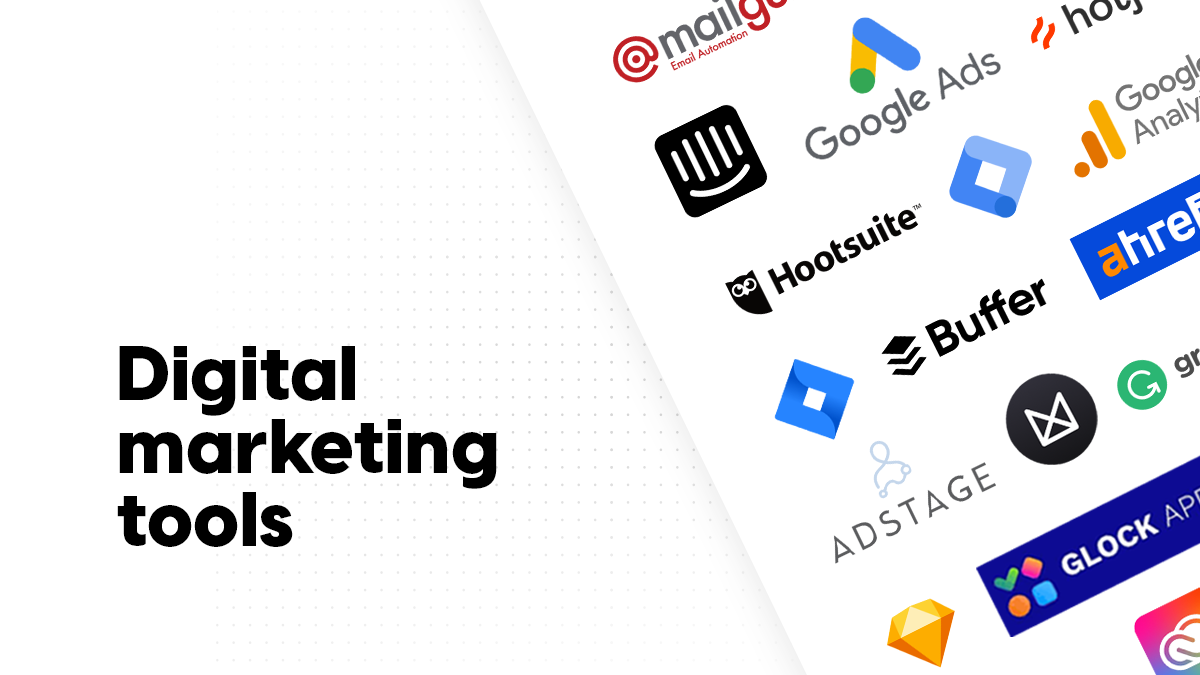Are you struggling to achieve your digital marketing goals? The world of online marketing can be overwhelming with endless tools and platforms available. However, the right digital marketing tools can make all the difference in helping you reach your target and grow your business.
The use of digital marketing tools is a necessity for companies that want to succeed in the digital era. These adaptable solutions offer a wide range of features and functionalities, enabling companies to run targeted advertising campaigns, analyze data, and enhance their online visibility.
Businesses can maximize their online marketing efforts and maintain an advantage in the cutthroat market of today with the right tools at their disposal. In this comprehensive guide, we’ll explore the essential digital marketing tools and how they can help you achieve your goals.
What are Digital Marketing Tools and How Do They Work?
Digital marketing tools refer to a wide range of software programs, platforms, and other resources that help marketers plan, execute, and evaluate their online marketing efforts. These tools cover a range of digital marketing functions, including social media administration, content generation and distribution, SEO, email marketing, data analytics, and more.
Such tools allow marketers to customize their campaigns, monitor performance indicators, and make data-driven decisions that will increase overall marketing effectiveness and help them accomplish business objectives in the online world.
Using technology and automation, online marketing tools aim to enhance and streamline many areas of the marketing process.
Read Also: Unlock Snapchat’s Marketing Potential for Businesses
- Arrangement and plan: Online marketing tools include functions for developing marketing strategies, establishing objectives, and identifying target markets. With market trends, competitor analysis, and customer segmentation, the software helps marketers in creating successful plans.
- Distribution of content: Graphics, movies, and text content can be created with the use of online marketing tools for content creation. They often come with templates, editing options, and teamwork tools. Tools for content distribution make it easier to share content on several platforms, including websites, social networking sites, and email campaigns.
- Analyze the data from social media: Social media account management is made easier with the help of online marketing tools. They allow companies to manage advertising campaigns, schedule posts, interact with followers, track mentions and comments, and evaluate social media metrics. For example, platforms like Snapchat are introducing advanced capabilities—check out the Snapchat Plus Features to see how premium tools can elevate your brand’s social media game.
- Search Engine Optimization: Websites can be optimized with the aid of SEO tools. To improve organic search ranks, digital marketing software offers features for keyword research, on-page SEO advice, backlink analysis, and performance monitoring.
- Email Marketing: Email marketing solutions simplify the development, administration, and automation of email campaigns. To increase engagement and conversion rates, they provide services like email templates, subscriber list management, personalization, and analytics.
- Customer Relationship Management (CRM): CRM systems help in tracking interactions, managing and organizing customer data, and automating procedures. You can segment audiences, tailor messages, follow consumers’ journeys, and increase customer retention.
- Sponsored campaigns and advertising: The planning and execution of online advertising campaigns, including pay-per-click (PPC), display, and social media advertisements, is made easier by online advertising tools. To enhance the effectiveness of campaigns, the software offers targeting options, ad production tools, budget management, and analytics.
- Analytics of Data: Web analytics tools gather and evaluate information from several digital marketing platforms. They produce reports, monitor KPIs, and offer insights into customer behavior, campaign efficacy, and return on investment. Marketers can use this information to improve their tactics.
Read Also: Mastering the Marketing Mix Strategies for Success With 4Ps
Top 5 Digital Marketing Tools Every Marketer Should Be Using
Discover the top 5 digital marketing tools that every marketer should be using. These powerful SEO software solutions provide valuable insights, keyword research, competitor analysis, and performance tracking. Stay ahead of the game with data-driven strategies and optimize your online presence. Boost your marketing efforts and drive targeted traffic to your website for maximum results.
Google Analytics:
Powerful online analytics software like Google Analytics gives advertisers in-depth knowledge of website traffic, user behavior, and conversion rates. It supports the tracking of important metrics, including page visits, bounce rates, session lengths, and conversion targets.
Advantages:
- Customizable dashboards and reports tailored to specific marketing objectives.
- Advanced features like e-commerce tracking, audience segmentation, and funnel analysis.
- Free to use for basic functionalities.
Disadvantages:
- Requires proper configuration and tagging to ensure accurate data collection.
- Limited real-time data reporting capabilities.
Semrush:
Semrush is a complete digital marketing solution that includes capabilities to enhance SEO, PPC advertising, content marketing, social media marketing, and competitive research. To help companies optimize their online presence and acquire a competitive edge, it includes features for keyword research, competition analysis, backlink audits, and website traffic analysis.
Advantages:
- Comprehensive SEO tools for on-page optimization, site auditing, and link building.
- PPC analysis features optimize ad campaigns and identify profitable keywords.
- Social media management features for scheduling posts, analyzing engagement, and monitoring brand mentions.
Disadvantages:
- The interface can be overwhelming for beginners due to the wide range of tools and features available.
Mailchimp:
A well-liked email marketing software, Mailchimp enables marketers to create, automate, and evaluate email campaigns. It has a user-friendly interface and a diverse set of capabilities for audience segmentation, performance tracking, and configurable templates. To nurture leads, develop client connections, and increase conversions, marketers can construct compelling email campaigns. Emails can be for nurturing leads, building customer relationships, and driving conversions.
Advantages:
- Automation features to set up personalized email workflows.
- A/B testing capabilities to optimize email subject lines, content, and design.
Disadvantages:
- Gets costly as the subscriber count increases.
- Some advanced features for automation workflows are only available on higher-tier plans.
Canva:
Canva is a user-friendly graphic design tool that enables marketers to produce eye-catching and expert-looking graphics without any advanced design expertise. It provides a large selection of templates, fonts, graphics, and design components that can be altered to meet certain marketing requirements. Marketers can use Canva to make interesting banners, infographics, slideshows, and more for social media.
Advantages:
- Extensive library of templates and design elements.
- Offers additional features and team collaboration options.
Disadvantages:
- A Canva Pro subscription is required for advanced features.
- Some features require additional payments or upgrades.
AdWords:
With the help of Google Ads, marketers can design and control online advertising campaigns that are displayed on a variety of channels, such as search engines, websites, and mobile apps. It provides targeting choices to reach audiences, bidding tactics to improve campaign effectiveness, and thorough analytics to monitor and assess campaign results.
Advantages:
- Targeted advertising options based on keywords, demographics, and interests.
- Flexible budget control and bidding strategies.
- Detailed analytics and reporting for campaign performance tracking.
Disadvantages:
- Ad policies and restrictions can limit certain types of advertising.
How to Choose the Right Digital Marketing Tool for Your Needs?
The success and efficiency of your marketing efforts can be significantly impacted by your choice of the best digital marketing tool. Make an informed decision by taking into account the following elements:
Identify Your Marketing Goals: Define your marketing objectives and goals forward. Are you trying to improve email marketing, social media engagement, website traffic, or conversions? Get the precise features and functionalities you require in a digital marketing tool to meet your goals.
Assess Your Budget: While considering digital marketing solutions, take into account your financial restrictions. Decide how much you are willing to spend and evaluate whether the price is in line with the benefits and features the product offers.
Evaluate Features and Functionality: To fulfill your marketing objectives, look for tools that give the precise features and functionalities you need. For instance, check if the software offers sophisticated automation, segmentation, and personalization choices. Make a list of essential qualities and rank them according to their importance in your marketing plan.
Consider User-Friendliness: Ease of use is crucial. Search for tools with user-friendly interfaces, obvious navigation, and intuitive workflows.
Read User Reviews and Seek Recommendations: You should do some research and study customer testimonials and reviews of the tools you are considering. Take note of the comments made about the tool’s dependability, customer service, performance, and overall user experience.
Take Advantage of Trials and Demos: Several digital marketing platforms provide demos, free versions, and trial periods. Take these opportunities to check the tool’s functionalities.
Read Also: Maximizing Profits with Price Discrimination Strategies
What are the Benefits of Using Digital Marketing Tools?
Digital marketing tools have some advantages, as they can improve your marketing initiatives and help your business succeed.
Improved Efficiency and Productivity:
- Automation features streamline repetitive tasks, saving time and effort.
- Centralized platforms allow for better organization and management of marketing activities.
Data-Driven Decision Making:
- Digital marketing tools offer robust analytics and reporting features to track campaign performance and user behavior.
- Access to real-time data allows for quick adjustments and optimization of marketing strategies.
- Data insights enable evidence-based decision-making, resulting in effective marketing tactics.
Increased Reach and Visibility:
- Digital marketing tools provide access to various online channels, expanding your reach.
- Search engine optimization (SEO) tools improve website visibility in search engine results.
- Social media management tools help engage with a wider audience and increase brand awareness.
Improved Customer Engagement and Experience:
- Digital Marketing tools enable personalized communication, fostering stronger connections with customers.
- Email marketing tools facilitate targeted and automated email campaigns for better engagement.
- Social media management tools allow for timely and interactive customer interactions.
Competitive Advantage:
- Digital marketing tools help you stay ahead of competitors in the online landscape.
- Access to advanced features and technologies gives you an edge in reaching and engaging with your target audience.
- Optimization and data-driven strategies enable continuous improvement and adaptability.
By leveraging digital marketing tools, businesses can optimize their marketing efforts, reach their target audience, and achieve better results in terms of engagement, conversions, and overall business growth.
4 Tips for Getting the Most Out of Your Digital Marketing Tools
Consider putting the standard instructions into practice to get the most out of your digital marketing tools and optimize their advantages:
- Set Clear Goals and KPIs: Identify your marketing objectives and key performance indicators (KPIs). Create SMART goals—specific, measurable, attainable, relevant, and time-bound—that are consistent with your overarching corporate objectives. Your feature selection, plan implementation, and success measurement will be influenced by your goals and KPIs.
- Understand and Utilize the Tool’s Features: Spend some time exploring and fully understanding the features and capabilities of the digital marketing tools you have selected. You can attend training sessions, read manuals, and utilize instructional resources offered by the tool’s vendor.
- Regularly Monitor and Analyze Performance: Use the analytics and reporting features to continuously track and evaluate the effectiveness of your digital marketing activities. Review important statistics, including website traffic, engagement rates, conversion rates, and return on investment (ROI). Determine trends, patterns, and areas that need improvement. Use the information to enhance your plans, improve the targeting, and efficiently spend resources.
- Stay Updated and Embrace New Features: New features and updates are often provided, and online marketing tools are continuously changing. To keep ahead of the curve and acquire a competitive edge, embrace new features that are in line with your marketing objectives and experiment with them.
You can get the most out of your digital marketing tools and produce the best results for your company by establishing clear goals, comprehending the features, keeping track of performance, and staying up to date.
How is AI Changing Digital Marketing and What Does it Mean for Your Business?
Artificial intelligence (AI) is fundamentally changing the world of digital marketing and has substantial business implications. Here are some ways that AI is altering digital marketing and what they mean for your company:
- Enhanced Personalization: By using data to understand client preferences, behaviors, and demographics, AI makes sophisticated personalization possible. To create highly targeted and personalized experiences across several marketing channels, machine learning algorithms evaluate large volumes of data.
- Improved Customer Insights: Large volumes of data can be processed and analyzed in real-time by systems driven by artificial intelligence (AI). It will provide useful information about customer trends and patterns. Businesses can develop more relevant and successful marketing initiatives that will increase customer satisfaction and loyalty.
- Intelligent Automation: AI eliminates time-consuming and repetitive procedures, allowing marketers to concentrate on more strategic initiatives. For instance, chatbots can respond to client questions and offer immediate assistance, saving both time and resources. Automation technologies driven by AI can speed up consumer segmentation, content creation, ad optimization, and email marketing. Businesses may increase productivity, scale operations, and provide consistent experiences by automating these procedures.
- Predictive Analytics and Forecasting: Predictive analytics helps in trend recognition, customer behavior prediction, pricing strategy optimization, and campaign performance forecasting. Businesses can better allocate resources, reduce risks, and stay ahead of market shifts by utilizing AI-driven insights, strengthening their competitive edge.
- Enhanced Customer Service: Customer service has changed because of AI-powered chatbots and virtual assistants that offer 24/7, quick, and individualized assistance. Chatbots can offer product recommendations, respond to commonly asked queries, and assist customers with purchases.
- Efficient Ad Targeting and Optimization: By analyzing user information, behavior, and preferences, AI systems improve ad targeting. The possibilities of conversions can be increased by using AI-driven solutions to distribute adverts to the right audience at the right time. To enhance campaign effectiveness and ROI, AI also enables real-time ad optimization, automatically altering bidding tactics, ad placements, and creative aspects.
Conclusion: Use the Right Digital Marketing Tool to Reach
To successfully reach the target audience and achieve marketing success, companies must use the appropriate digital marketing technologies. Given the wide range of tools available, it is crucial to take into account aspects such as unique marketing goals, budget, features, usability, scalability, and customer feedback.








